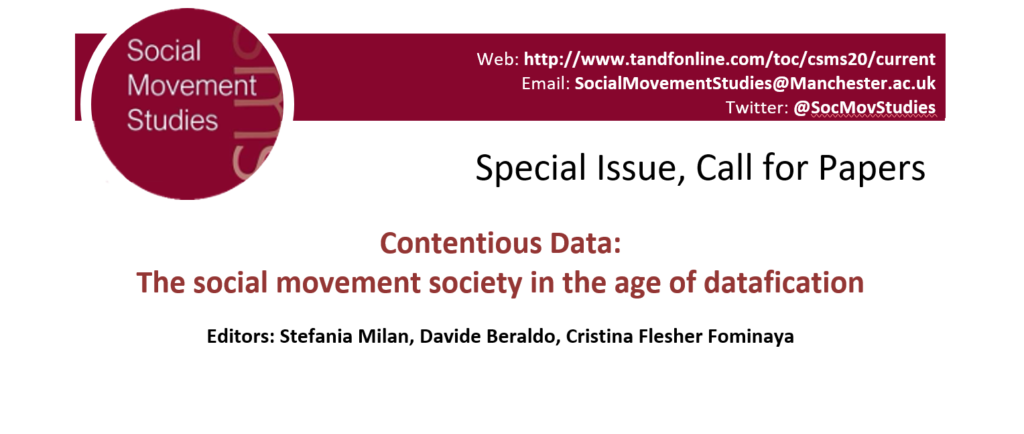Editors: Stefania Milan, Davide Beraldo, Cristina Flesher Fominaya
NEW DEADLINE: Due to COVID-19 situation, we have decided to extend the deadline. The new deadline is MAY 25, 2020
Datafication is changing the conditions under which contemporary social movements operate, opening up new terrains of contention. As a result, grassroots initiatives in the realm of data activism, data justice, algorithmic accountability and/or resistance to mass surveillance mushrooms in liberal and authoritarian regimes alike. These initiatives vary by scale, organizational forms, tactics, political visions and technological imaginaries. They may take data “as repertoires”, whereby data and data-based tactics are mobilized as constituents of innovative tactics, or “as stakes”, that is to say issues or objects of political struggle in their own right (Beraldo and Milan, 2019). However, they share an emphasis on the contentious politics of data.
While many instances of the contentious politics of data have come under the spotlight of specialists of digital politics and culture, social movement scholars are only starting to investigate the consequences of datafication on organized collective action. Yet datafication represents a paradigm change able to radically transform “social movement society”, urging social movements scholars to reflect on how it intersects with known social movement dynamics.
This Special Issue invites scholars of social movements and critical data studies to engage with i) case studies and ii) theoretical reflections illustrating the evolution of collective action vis-à-vis datafication. We are particularly interested in (interdisciplinary) theory development: fostering a dialogue across disciplinary boundaries, the Special Issue wants to bring the question of datafication -broadly defined -to bear on social movement scholarship, with the ambition of addressing what has been to date a “blind spot” in social movement literature, and cross-fertilizing disciplinary fields that have long remained disconnected.
Consequently, we welcome papers (max 8,000 words) engaging with the following:
• Unfamiliar empirical cases of: social movements’ critical engagement with the datafication agenda (e.g., Hong Kong activists dismantling lamp posts with surveillance cameras); creative incorporation of data-based practices and tactics in social movements’ repertoires (e.g., citizen-led collection of pollution data); social movements engaging in struggles around data issues (e.g., algorithmic accountability); examples of conflation between data as constituents of action repertoires and data as a contentious issue in its own right.
• Theoretical perspectives on, for instance, data activism, data justice, artificial intelligence, the relation between protest and social structures in the age of datafication, etc. as they intersect social movements and collective action processes, concepts, and research questions.
• Theoretical contributions on, e.g., the relation between data and the means-ends continuum in social movements, oriented to theory development in the field of social movement studies.
Submission Process and Deadlines
Abstracts due 30 April 2020
Acceptance announced by 15 May 2020
Paper development workshop last week of August 2020
Submissions due 30 November 2020
We invite the submission of structured extended abstracts (800-1000 words). Abstracts should be sent to contentiousdata-sms@data-activism.net no later than 30 April 2020. The outcome of the selection process will be notified no later than 15 May 2020. Prospective authors will be given the option to participate in a paper development workshop held at the University of Amsterdam in the last week of August (tentative date). Full paper submission (original articles of no more than 8.000 words) is due on 30 November 2020.
All papers will be subjected to double-blind peer review. For further instructions see the “Instructions for Authors” and “Style Guide” provided by Social Movement Studies.
Please contact us if you have any further inquiries:
- Stefania Milan (DATACTIVE, Department of Media Studies, University of Amsterdam): s.milan@uva.nl
- Davide Beraldo (DATACTIVE, Department of Media Studies, University of Amsterdam): d.beraldo@uva.nl
